PRINCETON, NJ -- On the eve of the 200th anniversary of Charles Darwin's birth, a new Gallup Poll shows that only 39% of Americans say they "believe in the theory of evolution," while a quarter say they do not believe in the theory, and another 36% don't have an opinion either way. These attitudes are strongly related to education and, to an even greater degree, religiosity.
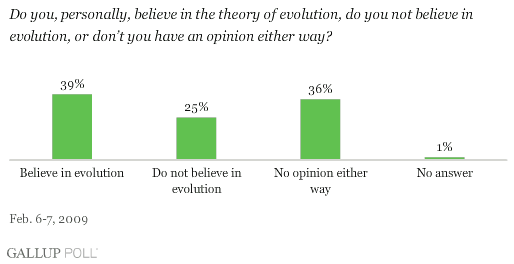
There is a strong relationship between education and belief in Darwin's theory, as might be expected, ranging from 21% of those with high-school educations or less to 74% of those with postgraduate degrees.
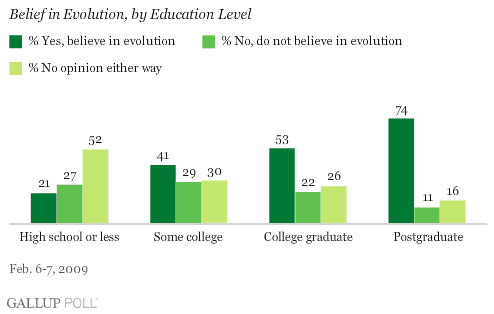
Those with high-school educations or less are much more likely to have no opinion than are those who have more formal education. Still, among those with high-school educations or less who have an opinion on Darwin's theory, more say they do not believe in evolution than say they believe in it. For all other groups, and in particular those who have at least a college degree, belief is significantly higher than nonbelief.
Darwin's theory has been at the forefront of religious debate since he published On the Origin of Species 150 years ago. Even to this day, highly religious individuals claim that the theory of evolution contradicts the story of creation as outlined in the book of Genesis in the Bible.
Thus, it comes as no surprise to find that there is a strong relationship between church attendance and belief in evolution in the current data. Those who attend church most often are the least likely to say they believe in evolution.
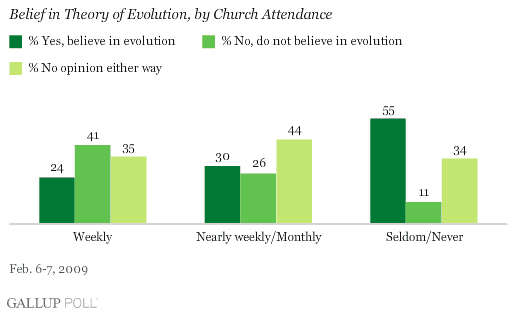
Previous Gallup research shows that the rate of church attendance is fairly constant across educational groups, suggesting that this relationship is not owing to an underlying educational difference but instead reflects a direct influence of religious beliefs on belief in evolution.
Younger Americans, who are less likely to be religious than those who are older, are also more likely to believe in evolution. Still, just about half of those aged 18 to 34 say they believe in evolution.
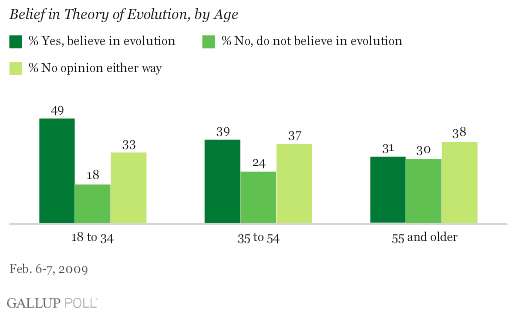
Awareness of Darwin's Association With Evolution
Before respondents in the current poll were asked about their belief in evolution, they were tested to see whether they could correctly associate evolution with Darwin. The results show that 55% of Americans can correctly name evolution (or another term closely associated with evolution, such as natural selection) when asked with which theory they associate Darwin.
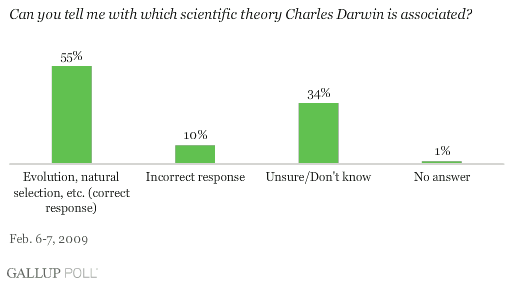
Again, as would be expected, correct identification of Darwin with his scientific theory is highly related to education.
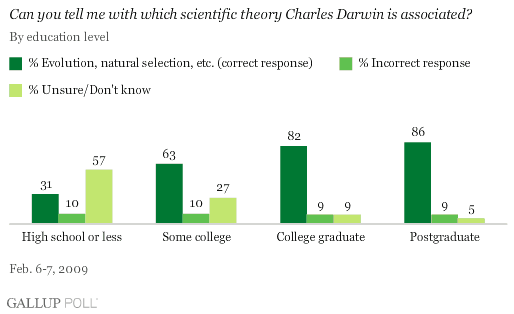
Correct identification zooms from only 31% among those with no more than a high school education all the way to 86% among those with postgraduate educations.
Americans who seldom or never attend church are slightly, but not overwhelmingly, more likely to correctly identify Darwin with this theory than are those who attend more often.
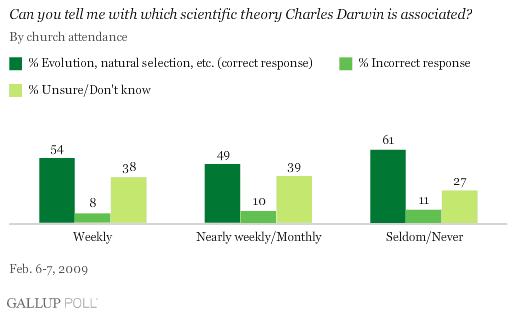
Correctly identifying the theory of evolution with Darwin is related to belief in the theory, but 29% of those who correctly link the two still say they do not believe in evolution. Of those who don't know or are unsure which theory Darwin is associated with, almost two-thirds also don't have an opinion on evolution, while those who do have an opinion are split down the middle as to whether they believe it.
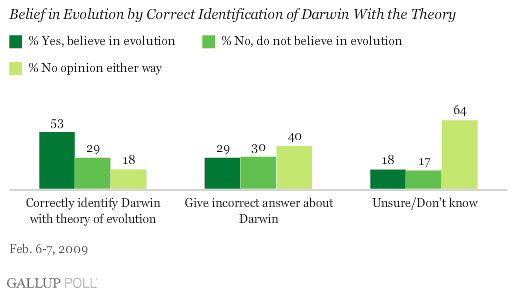
Implications
As Darwin is being lauded as one of the most important scientists in history on the 200th anniversary of his birth (on Feb. 12, 1809), it is perhaps dismaying to scientists who study and respect his work to see that well less than half of Americans today say they believe in the theory of evolution, and that just 55% can associate the man with his theory.
Naturally, some of this is because of educational differences. Americans who have lower levels of formal education are significantly less likely than others to be able to identity Darwin with his theory, and to have an opinion on it either way. Still, the evidence is clear that even to this day, Americans' religious beliefs are a significant predictor of their attitudes toward Darwin's theory. Those who attend church most often are the least likely to believe in evolution, and most likely to say they do not believe in it.
Survey Methods
Results are based on telephone interviews with 1,018 national adults, aged 18 and older, conducted Feb. 6-7, 2009, as part of Gallup Poll Daily tracking. For results based on the total sample of national adults, one can say with 95% confidence that the maximum margin of sampling error is ±3 percentage points.
Interviews are conducted with respondents on land-line telephones (for respondents with a land-line telephone) and cellular phones (for respondents who are cell-phone only).
In addition to sampling error, question wording and practical difficulties in conducting surveys can introduce error or bias into the findings of public opinion polls.
